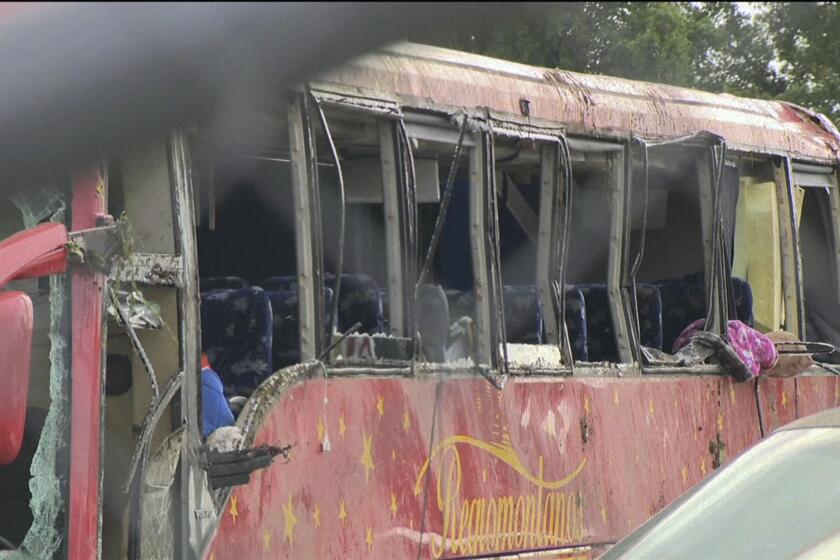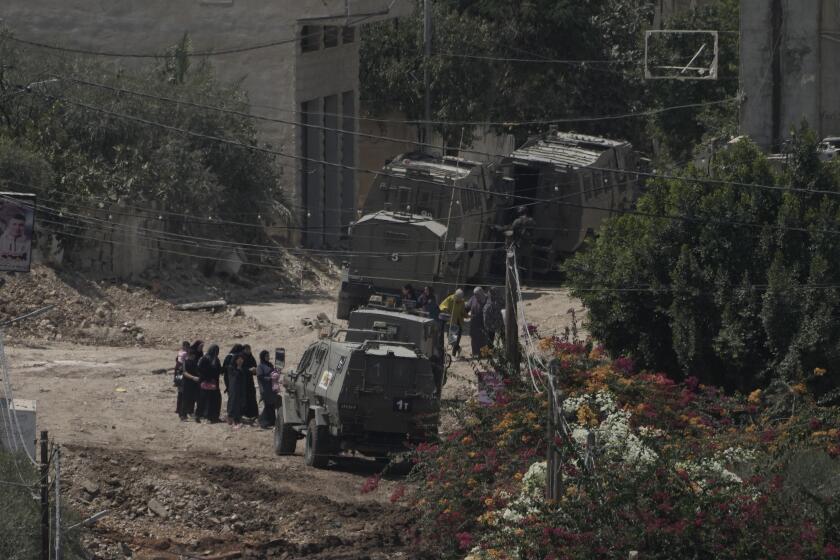COLUMN LEFT / GEORGE BLACK : Rich and Poor, Under the Volcano : Left behind to dig out, Filipinos gird for the next fight over ash-blanketed U.S. bases.
In a thoughtful speech to a California audience in 1984, Jon Tinker of the environmental group Earthscan reflected on the different ways in which rich and poor countries are equipped to deal with disasters. Recalling the westward flight from the dust bowl in “The Grapes of Wrath,” he commented: “Steinbeck’s Okies did not always like what they found there, but there was at least somewhere else to go. . . . There are no Californias in the Third World.”
The eruption of Mt. Pinatubo in the Philippines brings the remark to mind with special force. Nature--or an act of God, if you will--can sometimes expose the realities of rich and poor, of power and impotence, in the manner of a parable.
The mountain began to blow its top on Philippine Independence Day, June 12. The timing was ironic, since the story that played so dramatically on the evening news here was the battle to save Clark Air Force Base and Subic Bay Naval Base, two huge military installations that are a bitter irritant to Philippine nationalists.
Fourteen-thousand people from Clark were moved with prompt efficiency to Subic Bay. As it became clear that the threat from the volcano was not over, more than 20,000 dependents from both bases were being evacuated. A Navy battle group was diverted from Okinawa to spearhead the operation, led by the most modern nuclear-powered aircraft carrier in the fleet, the Abraham Lincoln. Evacuees were shuttled out on Air Force C-141 transports backed up by chartered civilian aircraft. There was one American fatality.
More than 260 Filipinos have died, suffocated by sulfur fumes, crushed in collapsing buildings, drowned in swollen rivers and mudslides. Others fled in pickup trucks and jeepneys, by bicycle and water buffalo or simply on foot, clutching children and domestic animals. Thousands took refuge in the bleachers of a Manila sports stadium, exposed to the elements.
The U.S. military was not altogether unmindful of the refugees’ plight. One million Meals Ready to Eat (MREs), happily surplus because of the speedy conclusion of the Gulf War, were distributed to the survivors. And U.S. troops found reasons to be cheerful at a time of crisis. One young sergeant at Clark told a reporter that he thought the volcanic eruption “was kind of neat. It looked like one of the nuclear tests at Bikini Island.” His superior officers also found a silver lining in the mushroom cloud, concluding that the disaster would lower the market value of the bases and so strengthen the United States’ hand in negotiations over their future “rent” when the current lease expires on Sept. 16.
Clark and Subic date back to the turn of the century, when President William McKinley decided that it was America’s mission to “uplift and Christianize” the Philippines. In the Cold War years, the bases were crucial to the containment of Soviet power in the Pacific. The Pentagon insists it still finds them necessary, even after last year’s Soviet pullout from Vietnam’s Cam Ranh Bay, the only Soviet base on foreign soil.
The Pentagon also likes to argue that the bases benefit the Philippine economy, although there is no reason to suppose that closing them would do any great harm. Civilian reconversion posed no special difficulties for Thailand when U.S. troops and bases were pulled out in 1976, after the defeat in Vietnam. The British shut down their naval base in Singapore in 1971, and it soon became one of the most successful shipyards in Asia. Manila’s Economic Development Foundation has estimated that the country could earn $300 million a year just by tilling the 100,000 acres of unused farmland inside the bases’ perimeters.
The Philippine government has proposed $825 million as a fair annual rent for the bases over the next seven years; the U.S. counteroffer is $360 million per annum for 10 years. Of course, this is not the bases’ only relationship to the local economy. Tens of thousands of Filipinos work at Clark and Subic and 20,000 women and children in the honky-tonk town of Olongapo have found employment of a sort servicing the sexual demands of U.S. sailors and airmen.
Wearied by yet another scene of mass calamity, Americans have begun to experience what the disaster-relief agencies call compassion fatigue. Watching the ash rain down from Mt. Pinatubo, the reflex is to flip the channel and hide behind the old cliche that life in the Third World is cheap. But a darker question remains: In those parts of the Third World where the United States has planted itself, are some lives not cheaper than others?
More to Read
Sign up for Essential California
The most important California stories and recommendations in your inbox every morning.
You may occasionally receive promotional content from the Los Angeles Times.






